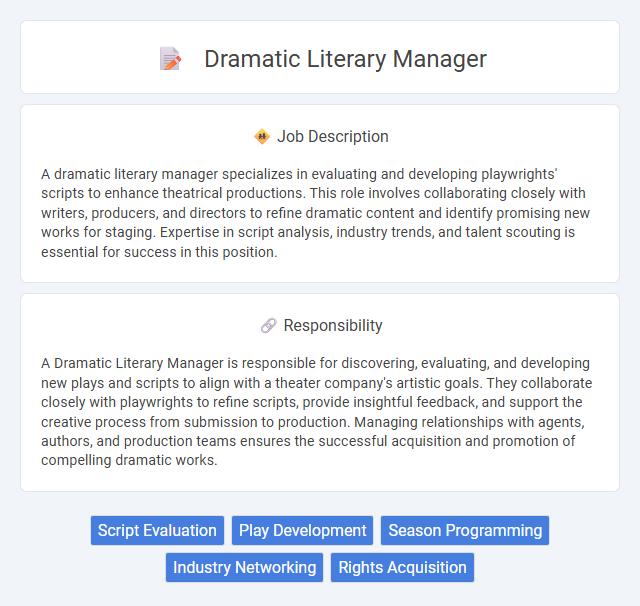
A dramatic literary manager specializes in evaluating and developing playwrights' scripts to enhance theatrical productions. This role involves collaborating closely with writers, producers, and directors to refine dramatic content and identify promising new works for staging. Expertise in script analysis, industry trends, and talent scouting is essential for success in this position.
Individuals with a passion for theater and strong communication skills are likely to thrive as dramatic literary managers, as the role probably demands a deep understanding of scripts and collaboration with playwrights. Those who enjoy analytical thinking combined with creative insight may find this career suitable, especially if they have patience and resilience for navigating the often subjective nature of literary evaluations. People who prefer dynamic environments with a mix of administrative tasks and artistic involvement could be well-suited, whereas those who favor purely solitary or routine work might not find this position fitting.
Qualification
A Dramatic Literary Manager typically requires a bachelor's degree in theater, literature, or a related field, combined with extensive knowledge of dramatic literature and script analysis. Strong communication, negotiation, and organizational skills are essential for managing playwright relationships and developing new works. Experience in theater production or literary agent roles enhances a candidate's ability to evaluate scripts and foster creative talent effectively.
Responsibility
A Dramatic Literary Manager is responsible for discovering, evaluating, and developing new plays and scripts to align with a theater company's artistic goals. They collaborate closely with playwrights to refine scripts, provide insightful feedback, and support the creative process from submission to production. Managing relationships with agents, authors, and production teams ensures the successful acquisition and promotion of compelling dramatic works.
Benefit
A Dramatic Literary Manager likely enhances a theater company's success by discovering and developing promising playwrights and scripts, increasing the quality of productions. Their expertise may lead to stronger relationships with writers and industry professionals, potentially opening doors to innovative projects and collaborations. This role probably contributes to a more dynamic and diverse theatrical repertoire, benefiting both the company and its audience.
Challenge
A Dramatic Literary Manager likely faces the challenge of identifying and nurturing emerging talent while balancing the demands of diverse stakeholders in the entertainment industry. The role probably involves navigating complex contract negotiations and adapting to shifting market trends to secure compelling scripts for production. Managing competing deadlines and maintaining a deep understanding of narrative structures might be essential to effectively support both writers and production teams.
Career Advancement
Dramatic literary managers play a crucial role in discovering and developing new plays, collaborating closely with playwrights and producers to shape theatrical productions. Career advancement for dramatic literary managers often involves progressing to senior artistic positions, such as artistic director or head of development within major theater companies. Building a strong network within the industry and gaining experience with critically acclaimed productions significantly enhances opportunities for leadership roles and broader creative influence.
Key Terms
Script Evaluation
A Dramatic literary manager specializes in script evaluation to identify compelling narratives that align with a theater's artistic vision. They analyze plot structure, character development, dialogue quality, and thematic elements to determine a script's potential for production. This role requires a deep understanding of dramatic literature, market trends, and audience engagement to recommend scripts that drive critical and commercial success.
Play Development
A Dramatic Literary Manager plays a crucial role in play development by identifying, evaluating, and nurturing new scripts and playwrights to ensure a theater's artistic growth. Responsibilities include reading submissions, providing constructive feedback, facilitating workshops, and collaborating closely with directors and producers to refine scripts for production. This position demands strong literary analysis skills, a deep understanding of theatrical trends, and the ability to cultivate creative relationships that drive innovative storytelling.
Season Programming
Dramatic literary managers play a crucial role in season programming by selecting compelling scripts that align with the theater's artistic vision and audience preferences. They collaborate with playwrights, directors, and producers to curate a diverse and engaging lineup that balances new works and classic plays. Their expertise in script evaluation and industry trends ensures a dynamic and financially viable season schedule.
Industry Networking
A Dramatic Literary Manager cultivates strong industry networking by building relationships with playwrights, agents, and theater professionals to discover and promote new scripts. They attend industry events, workshops, and festivals to stay updated on emerging trends and to connect with key decision-makers in the theater world. Their extensive network enables them to effectively advocate for their writers and facilitate successful script development and production opportunities.
Rights Acquisition
A Dramatic Literary Manager specializing in Rights Acquisition evaluates and secures adaptation and performance rights for plays, scripts, and literary works, ensuring legal clearance and maximizing creative opportunities. They negotiate contracts with authors, agents, and publishers to obtain exclusive or non-exclusive rights, safeguarding the company's intellectual property and production potential. Expertise in copyright law and industry standards is essential for managing rights portfolios and maintaining compliance throughout the theatrical development process.
 kuljobs.com
kuljobs.com